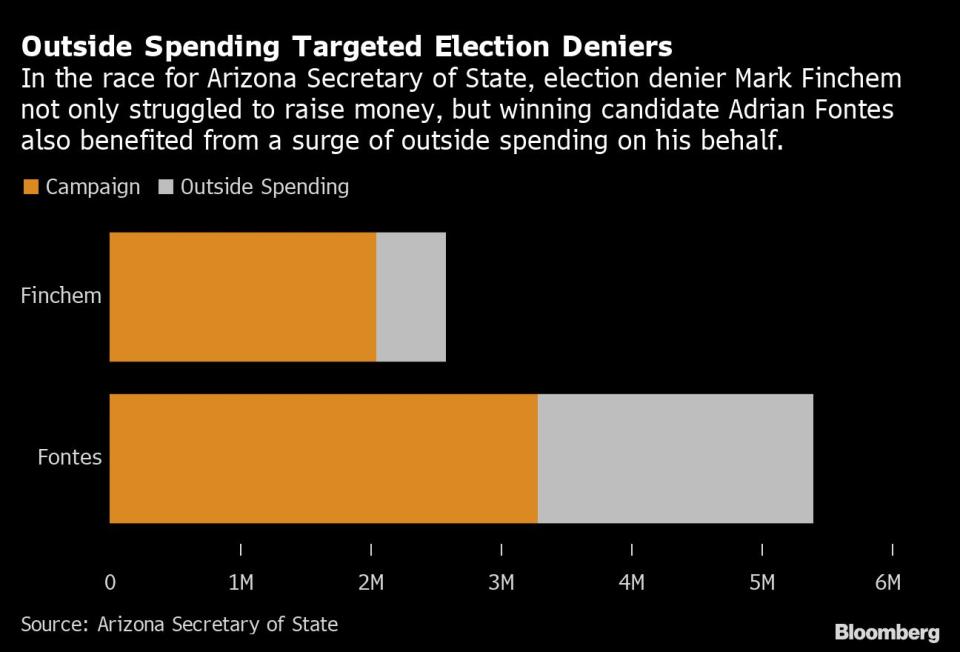Free Elections Won in 2022, But Deniers Will Be Back in 2024
(Bloomberg) -- An all-out offensive by activists and state officials against election denial scored major successes in clamping down on the “stop the steal” movement in 2022, amid continued attempts to undermine free and fair elections in the US.
Most Read from Bloomberg
Trump Hawks Superhero NFT Trading Cards as Crypto Universe Implodes
US Stocks Drop for a Second Day; Oil Snaps Rally: Markets Wrap
Advocacy groups spent millions on ads against candidates who adhered to Donald Trump’s false claims that he lost due to widespread fraud and were running to oversee voting in presidential battlegrounds or lead them as governors. Local and state elections administrators coordinated with law enforcement to ensure that polling places remained safe.
In the end, though, it was voters who had the biggest impact, rejecting election deniers for governor and secretary of state in five key states, re-electing officials who defied Trump’s efforts to overturn his loss and backing ballot measures to make it easier to vote and harder to challenge fair and accurate results.But an even bigger challenge will come in the high-stakes 2024 presidential election.Seeking a return to the White House, Trump is still making baseless claims about the US voting system in all caps and the Republican majority in the US House includes a large number who backed his efforts to overturn the 2020 election, including a handful who even urged the White House to declare martial law or take other dramatic steps, according to text messages obtained by the committee investigating the Jan. 6 attacks.
Here’s an overview of the developments from this year.
A broad alliance pushed back against election deniers
Once election-denying candidates won a slew of Republican primaries early this year, a broad-based coalition was ready to push back.
Groups like the Democratic Association of Secretaries of State, the Republican Accountability Project and the iVote Fund spent $46 million on a barrage of ads attacking election deniers running for secretary of state, a typically sleepy down-ballot race. They also ran ads against similar candidates running for governor in Pennsylvania, senator in Nevada and nine toss-up races for the US House.
There was no comparable Republican effort to promote the party’s own secretary of state candidates, and some election deniers struggled to raise money on their own. That allowed their opponents to ensure that election denial and other extreme positions they had taken remained front and center in the general election.
Election deniers lost where it mattered most
Spurred by the advertising blitz and intense media coverage of election denial, voters defeated “stop the steal” candidates for governor in the key competitive presidential states like Arizona, Michigan, Pennsylvania and Wisconsin; and for secretary of state in Arizona, Michigan and Nevada, all states that will determine the 2024 presidential election.
While election deniers won races for Congress, it proved a liability for Republican candidates in the Nevada Senate race and six of the nine targeted House races, all where the issue was highlighted.
Read More: GOP’s Election-Denial Bet Boomerangs as Key House Hopefuls Lose
Voters also approved measures expanding voting access as election deniers, including Trump in his presidential campaign announcement, continue to extol the virtues of in-person, one-day voting. Connecticut approved a constitutional amendment to allow early voting, while Michigan approved a constitutional amendment mandating ballot drop boxes, setting rules for post-election audits and requiring more early voting, almost a line-by-line refutation of some of Trump’s false claims of fraud in 2020.
The concession speech made a comeback
A number of prominent Republican candidates in 2022 refused to say during the campaign that they would accept defeat.
In the end, most of them did.
Losing Republican gubernatorial candidates Derek Schmidt in Kansas, Tudor Dixon in Michigan, Tim Michels in Wisconsin and Doug Mastriano in Pennsylvania, as well as Senate candidates Blake Masters in Arizona and Don Bolduc in New Hampshire all gave standard concession remarks.
Democrat Stacey Abrams, who notably declined to concede her 2018 loss to Kemp, called him after his win in their rematch this year.
The exceptions were failed candidates Kari Lake for Arizona governor, Mark Finchem for Arizona secretary of state and Kristina Karamo for Michigan secretary of state.
Disinformation spread online, but didn’t break through
Heading into the 2022 campaign, officials and voting rights activists worried that disinformation would spread online, hampering turnout and fueling post-election violence. But any such efforts fizzled.
Looking ahead, disinformation experts expect these kinds of claims will be routine after every election, but it remains to be seen whether they will ever take the kind of hold again that they did two years ago.
Meantime, new Twitter Chief Executive Officer Elon Musk has reinstated Trump and other accounts suspended for spreading disinformation while firing a number of staffers responsible for content moderation, raising concerns that the social media giant could be used to spread false claims.
Some local officials were forced to certify elections
Local officials in the battleground states of Arizona, Nevada and Pennsylvania cited debunked claims as they defied state elections laws.
Read More: Election Denying Local Officials Still Tried to Overturn Vote
In each case, state elections officials took action, and judges ruled that the local officials had to follow the law, use ballot-counting machines and certify the election results.
A bill that passed the US House would allow presidential candidates to fast-track a complaint to a panel of judges about local and state elections officials who refuse to certify. A companion bill expected to pass the Senate before year’s end only covers state officials.
Key Republicans softened their opposition to vote by mail, early voting
After a poorer-than-expected performance for Republicans in the midterms, some influential GOP officeholders have called for the party to reconsider that approach, including House Republican leader Kevin McCarthy, No. 2 Senate Republican John Thune, Florida Governor Ron DeSantis and Senator Marco Rubio, Fox News hosts Sean Hannity and Laura Ingraham, and former Trump adviser Kellyanne Conway.
“There were many in 2020 saying, ‘Don’t vote by mail, don’t vote early,’” Republican National Committee chair Ronna McDaniel said on Fox News without naming Trump. “And we have to stop that and understand that if Democrats are getting ballots in for a month, we can’t expect to get it all done in one day.”
The issue was weakened but warning signs visible for 2024
Despite the defeat of election-denying candidates, the midterms made clear that the issue may not be gone in the 2024 presidential election.
Trump, who launched his third presidential campaign in mid-November, has continued to obsess over the 2020 election, recently called for the US Constitution to be suspended to reinstate him to the Oval Office. He also called for a law that would limit voting to in-person on the first Tuesday of November.
Lake continues to dispute her loss in Arizona, even filing a lawsuit seeking to have ballots tossed from the state’s largest county or the election re-run, and Trump echoed her baseless claims, calling for her to be “installed” as governor.
And while her effort does not appear to be gaining much support, polls show a significant number of Republican voters still lack trust in the US election system overall.
Most Read from Bloomberg Businessweek
AmEx Hooked Big Spenders and Regained the Throne With a Pricier Platinum Card
Elon Musk’s Twitter Is a Shakespearean Psychodrama Set in Silicon Valley
China’s iPhone Factory Stumbles Give India a Chance to Swoop In
©2022 Bloomberg L.P.

 Yahoo News
Yahoo News 




